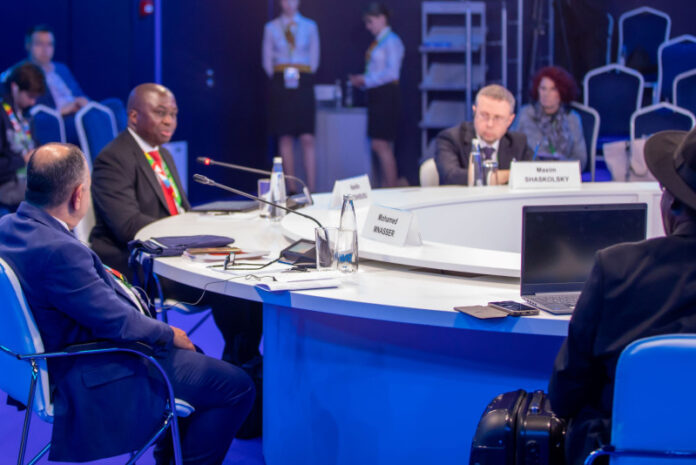
Modern global monopolies can only be countered by the same global antitrust initiatives, which can only be realized in the interstate format, which is currently represented by BRICS+
On July 28, on the margins of the second Russia-Africa summit, a meeting of the expert panel of antimonopoly agencies “Combating Anticompetitive Practices of Large Transnational Corporations, Suppressing Cross-border Cartels and International Cooperation” was held. The panel participants, including heads of antitrust agencies of African countries, discussed a number of important topics related to antitrust regulation. Key issues included the challenge of regulating global digital monopolies, the role of antitrust in ensuring global food and human security, and equitable participation of all countries in the global economy and access to technology transfer tools.
In his foreword Alexey Ivanov, Director of BRICS Competition Law and Policy Centre highlighted that “Antitrust law originally originated under conditions of uncertainty. In post-war Europe, in Russia during the transition to a market economy, in China with the beginning of the policy of reform and opening up, in South Africa after the fall of the apartheid regime and in Brazil with the end of the dictatorship, the adoption of antitrust laws helped the economic system to reach a new level of development. Now, in the context of global uncertainty, the question of the role of antitrust law arises again. Modern global monopolies can only be countered by the same global antitrust initiatives, which can only be realized in the interstate format, which is currently represented by BRICS+, to which the new members from African countries are also gravitating.”
The initiative to establish a Commission on Competition and Consumer Welfare in Africa was further developed. It is the second attempt for regulators from Kenya, Egypt, Mauritius, Nigeria, South Africa, Morocco, Gambia, Mauritius, Nigeria, South Africa, Morocco, Zambia and the Commission (COMESA), which includes 21 other African countries, to agree to proceed with the establishment of a working group for cooperation. The working group will focus on the sectors of e-commerce, aggregation services (online travel agencies and online classifieds), matchmaking services (search services and social platforms – Google and Meta, as well as e-call and delivery services such as Uber and Glovo), digital advertising (search and social media), fintech and cybersecurity.
“To date, we have been working in a coordinated manner to harmonize antitrust regulation through bilateral, regional and international cooperation among 29 African states. Normally, it takes decades from the negotiation of agreements to the adoption of laws and the formation of regulatory institutions to control competition in the market, but we have managed to achieve significant results in just a few years. Today, it is important to continue developing this area, given the global nature of the challenges and the need to further deepen cooperation between competition authorities”, – Hardin Ratshisusu, Deputy Commissioner, Competition Commission of the Republic of South Africa has stated.
Another hot topic of discussion was the merger deal between Bunge and Viterra, an agribusiness giants with a strong presence in the markets of Brazil, South Africa and Egypt. The merger of the two companies may lead to imbalances in the international food market, including due to the establishment, if the deal is approved, of control over logistics in this area by the new player. This case made even more urgent the problem of developing infrastructure to detect and monitor cross-border cartel activity, which threatens not only direct economic costs, but also social and humanitarian risks.
“Bunge and Viterra, Bayer and Mansanta. We know what steps should be taken to consider such transactions that do not contradict the antitrust laws of different jurisdictions. But there are certain obstacles on our way to control the cross-border cartels. Their emergence threatens to significantly disrupt the normal operation of international trade. Cases of cross-border cartels and cartel collusions are difficult to both detect and investigate. This is due to the inconsistency and lack of universal norms on anti-corruption actions. One of the important principles of control over cross-border cartels should be the principle of extraterritoriality, allowing claims to be brought against the entire business structure of the offending company, not only against legal entities in a particular country. This will require a higher level of cooperation and trust between the antitrust services of individual countries,” – said Mahmoud Momtaz, Chairman of the Egyptian Competition Authority (ECA).
“Today, market power is determined by control over big data. That is, companies are accumulating information, and a network effect is occurring. And today antitrust regulators can no longer ignore these facts and should actively conduct coordinated work in relation to global digital monopolies, including more active application of the network effect criterion,” – Ivanov added.
According to the expert panel discussion participants, one of the main problems of antitrust compliance control, as well as tools for investigations in this area, is the lack of technology and cooperation based on data exchange. Often such data can be sensitive to the domestic interests of individual countries. Exchanges between members of the global antitrust network can therefore only take place if there is trust. The development of joint initiatives and platforms for meeting and discussing such issues face-to-face should therefore lay the foundations for overcoming this problem.
At this point, the UN’s support for African and Russian antitrust initiatives has been an important factor. Teresa Moreira – Head, Competition and Consumer Policy Unit, United Nations Conference on Trade and Development (UNCTAD) stated that UNCTAD supports initiatives at the regional and international levels that can further strengthen anti-competitive enforcement tools.
Ms. Moreira made a special mention of Russia’s role in this process. “The foundations of mechanisms and tools for cross-border cartel control and, more broadly, for compliance with international competition law of UNCTAD’s Section “F” were laid back in the 1980s, but for a long time remained recommendatory. Only recently, thanks to the proactive actions of the Russian antimonopoly authorities and the BRICS International Centre, it has been possible to re-launch this discussion and work on transferring these recommendations into the sphere of mandatory norms”.








[…] Source link […]
Comments are closed.